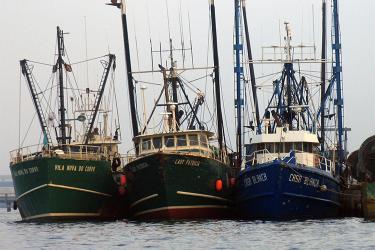On May 6, 2021, Henry J. Danzig of Tavernier, Florida, was sentenced to one year probation and a substantial payment of restitution to the Commonwealth of The Bahamas.
He was sentenced for illegally harvesting commercial quantities of reef fish from Bahamian waters. The reef fish were harvested near Cay Sal Bank, in The Bahamas, and transported back to the United States in violation of the Lacey Act.
Danzig and four other individuals were intercepted by the U.S. Coast Guard outside of Tavernier, Florida in May 2020 while returning from Bahamian waters. The Coast Guard escorted the vessel back to Danzig’s waterfront home. Together with Florida Fish and Wildlife Commission officers, they determined that Danzig and company were in possession of 167 reef fish. They harvested the fish in Bahamian waters without a valid Bahamian sportfishing license, and without first clearing Bahamian Customs. Even if Danzig had followed the rules, his catch was still nearly eight times over the legal Bahamian bag limit. The Coast Guard seized and transferred custody of the fish to NOAA’s Office of Law Enforcement, who began an investigation. OLE special agents later seized two GPS units from Danzig’s 39-foot Contender fishing vessel named Bodacious.
Danzig was charged with, and pleaded guilty to, trafficking 529 pounds of illegally harvested fish from The Bahamas back to the United States. Danzig’s plea agreement outlined a restitution payment to The Bahamas in the form of a new 2021 30-foot Contender vessel.
“This case is a double win for The Bahamas and the United States,” said Chargé d'affaires Usha E. Pitts, U.S. Embassy in The Bahamas. “Not only did our two countries collaborate to confiscate fish harvested illegally, the case resulted in the transfer of a brand new vessel that the Royal Bahamas Defense Force can use to prevent illegal, unreported, and unregulated fishing in the future. We will continue to work with our Bahamian partners to promote responsibility and accountability in Bahamian waters by all fishing vessels.”
Unfortunately, this kind of violation is not uncommon. “Many fishermen from the United States choose to fish in Bahamian waters due to its close proximity,” said Manny Antonaras, Assistant Director of NOAA’s Office of Law Enforcement, Southeast Division. “We want to make sure that they do so legally.”
How to Legally Fish in the Bahamas
Bahamian waters near southeast Florida begin at the end of the U.S. Exclusive Economic Zone. Generally, if you are south or east of the EEZ limit line, you are considered to be within the waters of the Bahamas and subject to Bahamian laws and regulations.
Learn more about the U.S. EEZ limit line location
Here are some simple steps to lawfully fish in Bahamian waters:
- If you use the new Click2Clear online system, you may electronically declare entry at a Bahamian port-of-entry and pay for your cruising permit. You must still physically arrive at that port to obtain authenticated documents from Bahamian Customs. Filing and paying for the permit in advance does not authorize formal entry into or fishing in The Bahamas.
- You can obtain your authenticated fishing permit at your port of entry.
- Once you have an authenticated fishing permit, you must operate within the prescribed Bahamian fisheries regulations. Note that your authenticated documents must be available for inspection.
- When leaving The Bahamas, you must declare exit at a port of entry. Bahamian Customs will provide an authenticated certificate of departure.
- U.S. vessels may not fish in Bahamian waters after obtaining exit clearance from Bahamian Customs (i.e., on the way home).
For more information, you may contact Bahamian Customs, or The Bahamas Consulate General’s Office in Miami, Florida.
It is important for U.S. fishermen to be aware of the overlapping jurisdictions involved when bringing back fish from The Bahamas. First, fishermen are subject to Bahamian Customs and Fisheries law. If out of compliance, they could face possible Lacey Act violations. Second, they are subject to possession limit laws in the U.S. portion of the EEZ. Lastly, fishermen are subject to state possession laws in Florida waters (0-3 nautical miles in the Atlantic, 0-9 nautical miles in the Gulf).
Tips for Planning a Bahamian Fishing Trip
The requirement to clear Bahamian customs applies to all U.S. fishing vessels, regardless of whether they are embarking on a single- or multi-day trip. “When making day trips it can be tempting to run over and not take the time to clear,” said George Poveromo, renowned saltwater angler, writer, and TV host. “Invest two hours and be 100 percent legal.”
“Don’t open yourself up to any problems,” said Poveromo. “You can usually leave the inlet at 6:00 or 7:00 AM and you’re waiting on customs to open up. Once you are properly cleared, you have all day to fish and can still get back home at dusk with enough light to come into the inlet.”
Preparation and knowledge are key before throwing your lines off. “Start in advance,” said Poveromo. “I fill out all my passengers’ information ahead of time and before we even clear the inlet all the necessary paperwork is good and we can run to the Bahamas.”
If you fail to follow the requirements you can be prosecuted for violations of both Bahamian and U.S. law. In The Bahamas, you can be fined up to $100,000, sent to prison for three years, or both. Under the U.S. Lacey Act, you can be fined up to $250,000, sent to prison for five years, or both.
To avoid these penalties, it is important that you understand and follow all relevant Bahamian, U.S. federal and state laws and regulations. Know before you go!





